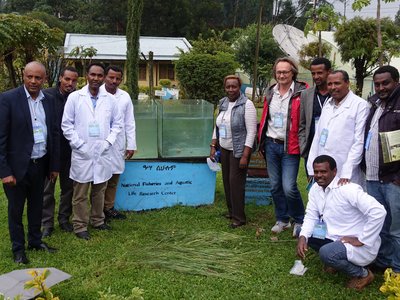

Scientific Cooperation between Austria and Ethiopia has a long tradition. Through scholarships master and PhD students have been trained in Austria and they are still engaged in projects with their former Austrian universities. One Example ist Aschalew Lakew Haile, who completed his PhD at BOKU. He is the director of the National Fisheries and Aquatic Life Research Center (NFALRC) in Ethiopia and the national coordinator of the project Sustainable Highland Rivers Management in Ethiopia | LARIMA, financed by APPEAR.
Water resources are important for livelihoods but in Ethiopian highlands, progressive deterioration of aquatic systems due to various influencing factors is ongoing. Therefore the aim of the project is to develop awareness of the essential nexus “land-water-people” for promoting river health and to initialise monitoring systems that inform decision-makers. The four-year project ended with an international conference, where scientists, experts and government officials from Africa, Asia and Europe came together. The event took place from 19th to 21st of July 2019 in Addis Ababa.
The president of Ambo University, Dr. Tadesse Kenea and the vice-president Dr. Bizunesh Mideksa welcomed around 100 participants from Northern, Eastern and Southern parts of the world. The first part of the conference focused on project outcomes, where in the beginning an overall project presentation was given by Prof. Wolfram Graf, the project coordinator. He was followed by Dr. Aschalew Lakew who reported about streams and rivers of Ethiopia and the contribution of the LARIMA project to sustainable management of riverine landscapes. The third presentation, held by the current APPEAR scholar Geda Kebede Oncho, was about the capacity building aspects of the project. In total 17 students were financially or technically supported by the project and finished their master thesis within the project period. The second part of the first conference day was dedicated to specific results of project research items. Besides, a talk about the biological longitudinal zonation of the Awash River – from source to lake Gemeri (Dr. Paul Meulenbroek), socio-economic services of streams and rivers for community livelihood (APPEAR scholar Hiwot Teshome) as well as important aspects of microbial-based assessment of the upper Awash river (Geda Kebede Oncho) were covered. Day one closed with a visit at the National Fishery and Aquatic Research Center in Sebeta near Addis Ababa.
The second day provided an insight into student’s research results. Olyad Dereje (former APPEAR scholar), Tsige Fekadu, Girma Abebe and Genanew Tesfaye were some of the grant holders and technically supported students, who were talking about the assessment of river water quality by using BMI as an indicator, fish diversity and abundances along the Awash River and morphological and genetic variations of Oreochromis niloticus – the Nile Tilapia -population in Ethiopia. In the afternoon-session, user and research experts were presenting various concepts of bioassessment and biomonitoring approaches in different areas (Dr. Astrid Schmidt-Kloiber, Austria; Prof. Subodh Sharma, Nepal; Dr. Frank Masese, Kenya; Dr. Vere Ross-Gillespie, South Africa), the ecological status of Guna Mountain Range (MSc. Hailu Menale, former North-South Dialogue scholar) and how to bridge the gap between research and responsible authorities (Dr. Lillian Idrakua).
The last day of the conference was filled with recent biodiversity research topics and establishment of biodiversity networks. Dr. Steffen Pauls gave a talk with the title “Integrative taxonomy and bioassessment in African freshwaters”, while Dr. Astrid Schmidt-Kloiber focused on biodiversity data and international networks. From biodiversity networks we moved on to capacity building and networking, where Prof. Nzula Kitaka, Dr. Tadesse Fetahi, Dr. Getachew Benebere and Mag. Gerold Winkler presented established collaborations in international training programmes between Europe and Africa. The morning session was rounded off with a talk of Dr. Birhan Asmamaw about animal biodiversity of Ethiopia and major threats focusing on Lake Afdera. A glance into the future was ventured by developing new project ideas with North-South and South-South connections. Within a workshop, Africa-specific environmental and socioeconomic problems were intensively discussed and the outlines of a future project were defined. Within an integrative framework of various disciplines a transnational model-catchment was identified with the aim to assess anthropogenic stressors comprehensively and to mitigate their effects effectively. A discussion regarding funding opportunities ended the conference.
More than 25 alumni and network partners were participating in the LARIMA final conference. Project outcomes were presented, research results discussed and future networks and project ideas were developed. It was a busy, successful and constructive meeting with a promising potential for future collaborations!
LARIMA ….. to be continued!!
Downloads
-
Final conference folderPDF·250 KB
